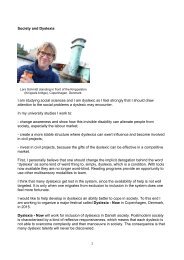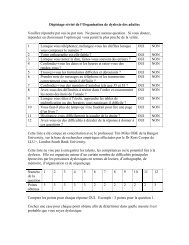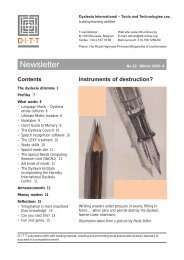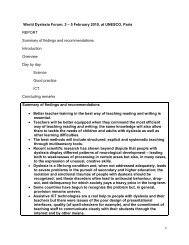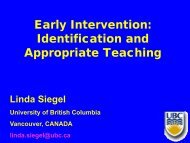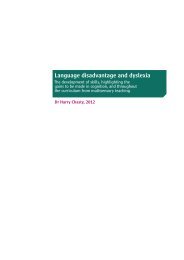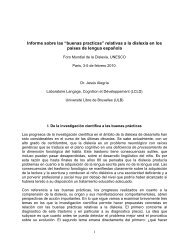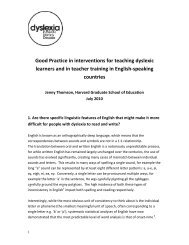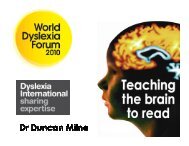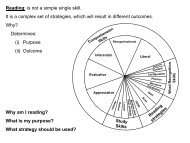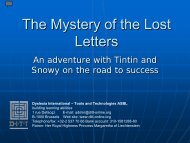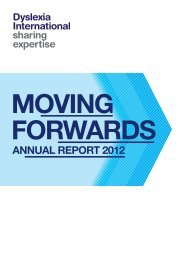here - Dyslexia International
here - Dyslexia International
here - Dyslexia International
Create successful ePaper yourself
Turn your PDF publications into a flip-book with our unique Google optimized e-Paper software.
1REPUBLIC OF NAMIBIAMINISTRY OF EDUCATIONPrivate Bag 13186, WINDHOEKEnquiries: Dr Susanchen Fourie Tel: (061) 217977 / 0812 602 774File no: 15/2/3 Fax: (061) 217974Email: susanchen@act.com.naCourse Director<strong>Dyslexia</strong> <strong>International</strong>1, rue DefacqzB - 1000 BrusselsBELGIUM 1 December 2010Dear Dr GoetryReport on activities following the World <strong>Dyslexia</strong> Forum, Paris, Franceand proposed way forwardPlease receive <strong>here</strong>with the Report on activities following the World <strong>Dyslexia</strong> Forum, Paris, Franceand proposed way forward as it relates to the Ministry of Education, Namibia.The Ministry of Education <strong>here</strong>with wishes to again express our appreciation to UNESCOand <strong>Dyslexia</strong> <strong>International</strong> for enabling a Ministry official to attend the <strong>International</strong> Forumon <strong>Dyslexia</strong> in France earlier this year. This report relates to the process of disseminating theinformation on <strong>Dyslexia</strong> as widely possible in Namibia.The Ministry has committed itself to the establishment of inclusivity, education for all and learnercentrededucation. Moreover, in the light of equity and a pro-poor approach it is imperative to alsoafford learners who come from poor or marginalised households with the opportunity to be assessedfor <strong>Dyslexia</strong> and receive special examination considerations and learning support.Thanking you for your longstanding support for the Ministry of Education programmes.Yours sincerely……………………………………Mr AM IlukenaPermanent Secretary
2REPUBLIC OF NAMIBIAMINISTRY OF EDUCATIONPrivate Bag 13186, WINDHOEKEnquiries: Dr Susanchen Fourie Tel: (061) 217977 / 0812 602 774File no: 15/2/3 Fax: (061) 217974Email: susanchen@act.com.na1 December 2010Report on activities following the World <strong>Dyslexia</strong> Forum, Paris, Franceand proposed way forwardThe Ministry of Education <strong>here</strong>with wishes to again express our appreciation to UNESCO and<strong>Dyslexia</strong> <strong>International</strong> for enabling a Ministry official to attend the <strong>International</strong> Forum on <strong>Dyslexia</strong> inFrance earlier this year. This report relates to the process of disseminating the information on <strong>Dyslexia</strong>as widely possible in Namibia.
31. Background and motivationThe raison d’etre of the education system is the learners. The following statistics have reference tothe Namibian situation:Analysing the progress of the 1998 Grade 1 entrants: 30% of the 1998 cohort droppedout after the primary phase; 42% of the learners dropped out before the Grade 10-examinations; and an estimated 65% did not proceed to the senior secondary phase… 1 Apparently 20% of all school-going children are repeating a grade in any given year 2 . Out of a total of approximately 66 000 learners entering each grade, about 20 000learners from Grades 1 to 9 drop-out - 12 000 from the Primary phase and 8 000 fromthe Junior Secondary phase 3 .At the beginning of 2007 and 2008, about 17000 Grade 10 learners were left on thestreet.Comparing Namibia’s SACMEQ II 4 results with those of the other 13 participatingcountries is alarming. Namibia’s learner reading scores are third from the bottom, theteacher reading scores are below the SACMEQ average. In Mathematics Namibianlearners were bottom and the teachers second from bottom.According to international trends it is expected that between 5 and 10% of learnershave a Learning Disorder.Evidently, learners with learning disorders have to be identified as early as possible, receivelearning support and obtain special examination arrangements – as is their right - to optimallyattain their educational potential.2. Report on achievements1. The DVD copies of the presentations made at the Forum have been distributed to the thirteenRegional offices (13), the National Institute of Educational Development (1), the Division:Special Programmes and Schools (1), the Division: Diagnostic, Advisory and TrainingServices (4) and 5 copies for the University of Namibia (UNAM) and its four campuses. Welook forward to the use of these resources during pre-service teacher training by UNAM.2. The Head Office School Counsellors and Regional School Counsellors (RSC) who resortunder the Division: Diagnostic, Advisory and Training Programmes are responsible forassessment and “diagnosis” 5 . From 15 to 16 November 2010 – prior to the NationalDevelopment and Planning Workshop – 30 School Counsellors were trained on <strong>Dyslexia</strong> byone of the Namibian experts in <strong>Dyslexia</strong>, Ms Magda Swanepoel. This introductory trainingwas deemed necessary as training on the administration and analysis of <strong>Dyslexia</strong> AssessmentInstruments is planned for May 2011.3. The Education Officer: Learning Support from the National Institute of EducationalDevelopment (NIED) and some of her team members also attended the mentioned Introducing1Dr Andrew Clegg (2008) using the Annual EMIS Statistics and the enrolments to the Grade 10 Examination.2Mr January (2008) Chief Education Officer: NIED, Presentation during the National Education Conference.3EMIS (2005)4 Southern and Eastern Africa Consortium for Monitoring Educational Quality II - Report, December 2004.5Diagnosis is a misnomer; only Psychologists registered with the Health Professions Council may diagnose. Counsellors may, under thesupervision of a psychologist, “identify”.
<strong>Dyslexia</strong> workshop. It was indicated that some of the information would be used during thein-service training of teachers in Learning Support.44. The Directorate: National Examination and Assessment (DNEA) requires that learners withLearning Disorders be subjected to a psychological assessment in order to apply for specialexamination arrangements. Please refer to the document Rules in terms of Section 15 of theEducation Act (Act No 16 of 2001). Currently only Namibian parents that can afford privatepractitioners apply for special examination arrangements with DNEA. In order to createequitable opportunities for all learners with Learning Disorders the following instrumentswere purchased for each of the regions and for Head Office with ETSIP funding:The <strong>Dyslexia</strong> Screening Test: Secondary for every region (and, additionally, for HeadOffice the <strong>Dyslexia</strong> Screening Test: Junior).The NEALE Analysis of Reading Ability - The NEALE is used to determine theaccuracy, rate (speed) and depth (comprehension) of reading performance. OneNEALE for every region and for Head Office.York Assessment of Reading for Comprehension (YORK) – As the YORK has onlybeen published in 2009 no information is available on its appropriateness for Namibia,w<strong>here</strong>as the NEALE is used by some practitioners with success for specialexamination considerations with the Directorate: National Examination andAssessment. One YORK for Head Office so that the instrument can be evaluated.At this time none of the RSCs is a psychometrist (i.e. a registered PsychologicalCounsellor or Psychologist); they will t<strong>here</strong>fore only be allowed to administer the<strong>Dyslexia</strong> Screening Test and scholastic tests (Category A and Category Bpsychological tests), but not an IQ test (Category C).3. Proposed way forward1. The School Counsellors should be trained in the administration, marking of protocols, analysisand report writing as it relates to the assessment of learners with <strong>Dyslexia</strong>. It is suggested thatMs Magda Swanepoel – recognized as first-rate assessors by the DNEA and facilitator of theNovember 2010 workshop on Introducing <strong>Dyslexia</strong> - present this training. Dr SusanchenFourie will assist her. A four-day workshop with a practical component is anticipated. Weexpect about 50 participants, which will include:the School Counsellors,the Education Officer: Learning Support from NIED and some of her team members,selected Regional Lower Primary Advisory Teachers,a representative from the Division: Special Programmes and Schools anda representative from the Directorate: National Examination and Assessment.We hope that UNESCO might be willing to fund this workshop corollary to the UNESCOWorld Forum for <strong>Dyslexia</strong>.2. Subsequent to the World <strong>Dyslexia</strong> Forum in Paris, <strong>Dyslexia</strong> <strong>International</strong> offers an OnlineLearning Course. This wonderful opportunity is difficult to take advantage of: many officialswith the Ministry of Education, Namibia, either do not have access to the internet, has alimited bandwidth, or can use the internet only for short periods because facilities are shared.We will either have to use the Book Version when it is available, or withdraw some of theprincipal teacher trainers to a facility w<strong>here</strong> they can use the internet, say for four full days.
The last option, although much more expensive, would clearly be more interactive andstimulating.5We would appreciate <strong>Dyslexia</strong> <strong>International</strong> and UNESCO’s views on this matter.The Ministry has committed itself to the establishment of inclusivity, education for all and learnercentrededucation. Moreover, in the light of equity and a pro-poor approach it is imperative to alsoafford learners who come from poor or marginalised households with the opportunity to be assessedfor <strong>Dyslexia</strong> and receive special examination considerations and learning support.……………………………………Ms Susanchen Fourie (DPhil)Educational Psychologist……………………………………Ms Edda BohnDirector: Programmes and Quality Assurance



